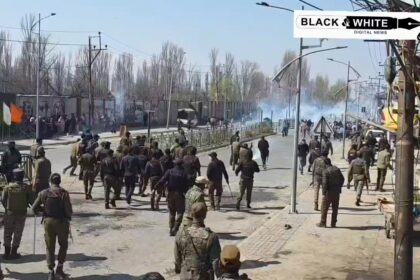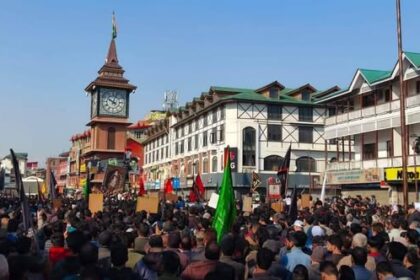||Black and White Digital News ||
||Parvinder Singh February 19,2025 ||
Kalakote :In a dramatic turn of events, the Hon’ble MLA of Kalakote has publicly accused officials of the Jal Jeevan Mission (JJM) of gross negligence, alleging that their failure to implement the Har Ghar Jal, Har Ghar Nal scheme is putting the lives of the people at risk. The flagship initiative of Prime Minister Narendra Modi, aimed at providing clean drinking water to every household, is being taken lightly by the concerned department, according to the legislator.
During a scheduled field visit, the MLA found that key government officials, including the Junior Engineer (JE), Assistant Executive Engineer (AEE), and Executive Engineer (Xen), were absent despite prior intimation. This blatant disregard for their duties and disrespect towards an elected representative has sparked outrage over the lack of accountability in governance. The MLA lambasted the officials for undermining the government’s mission and betraying public trust.
Public Outrage Over Negligence in Water Supply:
For months, the residents of Kalakote have been suffering due to erratic and inadequate water supply. Despite repeated complaints, no substantial action has been taken, forcing many to depend on unsafe or unreliable sources of water. The absence of officials on the ground has further fueled allegations of corruption and inefficiency in the implementation of the scheme.
“The Prime Minister launched this scheme to ensure clean water for every household, but these officials are treating it as a joke. Their negligence is not just a failure of duty; it is an act of betrayal against the people. They must be held accountable,” the MLA stated.
MLA Calls for Stern Action Against Erring Officials:
To address the issue, the MLA has demanded strict action against the absent officials and recommended a six-point strategy to ensure accountability:
1. Issuance of Official Notices – Formal notices should be sent to the absent officers, demanding an explanation for their dereliction of duty.
2. Departmental Inquiry – A thorough investigation should be conducted to determine whether their absence was due to negligence or administrative failure.
3. Immediate Disciplinary Action – Pending the inquiry, strict action such as suspension or withholding of salaries should be enforced.
4. Public Disclosure of Findings – The inquiry results should be made public to ensure transparency and accountability.
5. Escalation to Higher Authorities – If officials continue to neglect their duties, the matter should be taken up with the Chief Secretary and other senior officers for strict disciplinary measures.
6. Implementation of a Monitoring System – A real-time tracking system should be introduced to monitor the attendance and efficiency of officials on the ground.
A Pattern of Administrative Apathy?
This is not the first time officials have been accused of negligence in Kalakote. Residents have previously complained about the lack of responsiveness from government departments, especially in critical sectors like water supply, electricity, and road infrastructure. Despite several high-level interventions, little has changed on the ground.
“This isn’t just about today. This is about a long-standing pattern of neglect. If we don’t take action now, tomorrow it will be another department failing the people. Governance should mean responsibility, not excuses,” the MLA asserted.
Will the Government Act or Ignore?
The controversy surrounding the Har Ghar Jal scheme’s implementation in Kalakote has put government accountability under the spotlight. With public anger mounting and an elected representative openly calling out bureaucratic inefficiency, the issue has become a test case for governance and administrative discipline.
The question now remains: Will higher authorities take the necessary action against the negligent officials, or will this incident be swept under the rug? The credibility of the administration and the effectiveness of public welfare schemes are at stake.
For the people of Kalakote, this issue is not just about water—it is about trust in the system. The coming days will reveal whether that trust will be restored or further eroded.
Leave a comment
You Might Also Like
Police use tear gas shells to disperse people protesting the killing of Iran’s supreme leader, Ayatollah Ali Khamenei, in Srinagar.
Police use tear gas shells to disperse people protesting the killing of Iran’s supreme leader, Ayatollah Ali Khamenei, in Srinagar.…
0 Min Read
Mehraj Malik Aam Logon Ki Bat Karta Tha Isliye Uspar PSA Laga Diya CM Omar Abdullah Sahab Nhi Chahte Wo Bahar Aaye Amit Kapoor
Mehraj Malik Aam Logon Ki Bat Karta Tha Isliye Uspar PSA Laga Diya CM Omar Abdullah Sahab Nhi Chahte Wo…
0 Min Read
Ayatullah Khameni Shaheed Huve Hai Na Jhuke Hai Na Jhikege Protest In Bathandi Jammu
Ayatullah Khameni Shaheed Huve Hai Na Jhuke Hai Na Jhikege Protest In Bathandi Jammu
0 Min Read
Iran’s Supreme Leader Ayatollah Ali Khamenei, Who Led The Islamic Republic Since 1989, Is Dead At 86 Protests In Kashmir Against Killing Of Iranian Leader Khamenei
Iran’s Supreme Leader Ayatollah Ali Khamenei, Who Led The Islamic Republic Since 1989, Is Dead At 86 Protests In Kashmir…
0 Min Read









